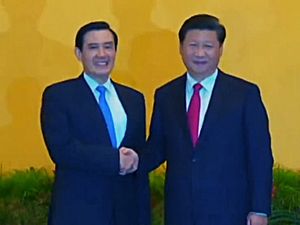The United States applauds the meeting between the presidents of Taiwan and mainland China. Commenting on the historic summit, John Kirby, US State Department Spokesman, declared that “The United States welcomes the meeting between leaders on both sides of the Taiwan Strait and the historic improvement in cross-strait relations in recent years. The United States has a deep and abiding interest in peace and stability in the Taiwan Strait, and we encourage further progress by both sides toward building ties, reducing tensions, and promoting stability on the basis of dignity and respect.”
The statement took few observers by surprise. This is because the first-ever meeting between the leaders from both sides of the Taiwan Strait squares with longstanding and consistent U.S. policy. And the initiative resonates well with the American people who do not want to become entrapped in a war with China over Taiwan. Are there any general lessons that might be learned from this breakthrough?
In the 1940s, the U.S. became entangled in the Chinese Civil War and agreed, albeit reluctantly, to help negotiate a peaceful settlement between the combatants. The end result was a disaster. Both sides criticized the U.S. and blamed Washington for an undesired outcome in the conflict. As is so often the case, neither side really wanted the U.S. to act as an “honest broker.” This has not changed. From time to time, voices in Beijing or Taipei will ask America to help broker a settlement between the two sides. But Washington steadfastly refuses to do so.
After breaking relations with Taipei and establishing diplomatic relations with Beijing in 1979, American policy appeared confusing. This is because the U.S. position toward Taiwan’s future is outlined in the three U.S.-China Communiqués, the Taiwan Relations Act, and a variety of executive and legislative branch statements. However, as State Department officials explained, the U.S. position is firm and consistent on two points. First, the resolution of the Taiwan issue is a matter for the people on the two sides of the Taiwan Strait to settle by themselves. Second, any resolution of the Taiwan issue must be peaceful. In keeping with this policy, America has a long history of support for dialogue and discussions between Beijing and Taipei. But it will not play a role as mediator or negotiator.
Relations between Taiwan and mainland China have improved enormously since Taiwan’s voters elected Ma Ying-jeou as president in 2008. For example, the two sides have signed 23 landmark agreements, there are hundreds of direct flights between the mainland and Taiwan every week, and four million Chinese tourists visited Taiwan last year. Nevertheless, the announcement that the leaders of Taiwan and mainland China would meet in Singapore caught the world by surprise. But the message seems to underscore an important lesson for American diplomacy.
One could argue that recent breakthroughs in relations between Taipei and Beijing – including the remarkable summit meeting in Singapore – underscore the fact that the U.S. does not always need to stick its nose into every dispute across the globe. The people on the two sides of the Taiwan Strait are proving to be smart enough to eventually resolve this messy conflict on their own. Decision-makers in Washington would be well advised to consider whether they might draw some lessons from the detente across the Taiwan Strait and if these lessons might be applied to certain other foreign policy challenges. For example, was it prudent for the Obama administration to junk longstanding U.S. policy in 2010 and offer to mediate a settlement of the complicated South China Sea dispute? Has that new policy actually helped bring peace or stability to the region? Or has the U.S. interjected itself into the middle of yet another intractable problem that might best be settled by the disputants? Perhaps Washington needs to consider the case of the Taiwan-China problem before commiting itself to more foreign quarrels.
Dennis V. Hickey is Distinguished Professor and Director of the Graduate Program in Global Studies in the Department of Political Science at Missouri State University. He is not affiliated with any government agency, political party or partisan think tank in Taiwan or the Chinese mainland. The views expressed in this op-ed are his own.

































